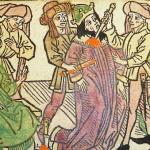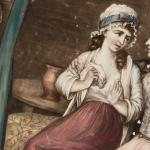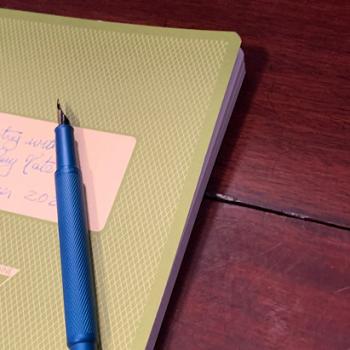- Reading.
If a Christian, you are in a religion that prizes literacy and has spread the art of reading wherever we have gone. If you live in a nation with a Christian history, then literacy was a gift of a Faith that begins the world with the Word. The Word was made flesh and then that Word spoke words, as God always had, and they were written down.
He breathed through the authors.
We must read if we can and most of us are able, but what of reading well? We read, therefore we see words, how to see the Word? I was trained in analytic philosophy, but chose a career teaching college general education. My days are spent with literature, but I am not a scholar of literature. As a result, I must carefully attend to those who are. My job puts that unique requirement on me, but I have learned from it that everyone would benefit by paying attention to the experts.
We read, they can teach us to read well. We might, on our own, learn to enjoy Shakespeare dimly, but they can wipe away most of the mental fog and help us hear and read Shakespeare better. Most vitally, reading well can make us better by showing us virtue and helping us to experience it through the imagination.
KSP to the Rescue
The good news is the English professor Karen Swallow Prior (KSP) has written a book to help us read virtuously or excellently. How could this be?
Literature embodies virtue, first, by offering images of virtue in action and, second, by offering the reader vicarious practice in exercising virtue, which is not the same as actual practice, of course, but is nonetheless a practice by which habits of mind, ways of thinking and perceiving, accrue.*
KSP argues that the habits of mind necessary to read well cannot be found in short form pieces (like this little review). We need to wrestle with the text extensively. Having spent decades teaching college undergraduates to read, I can confirm her diagnosis and prognosis. Dr. Prior has written a book that promises a cure not just for “those people,” but for all of us. As she points out, the necessity of the Internet to our work and the reading habits social media encourages makes all of us, including me, read more with less excellence.
She joins Milton in seeing value in reading “promiscuously,” but most of us are in no danger of reading little. Social media is an-all-you-can-read buffet, but the quality of the product and the time needed to digest harder ideas is discouraged. The buffet reading plan gives us words, but no time to find the Word.
In Which I send Certain Apologists to KSP
KSP has a valuable caution that reading virtuously is not strip mining a book for “what to think.” Apologists would do well to read and reread this Introduction to avoid the error of looking for ammunition while reading, rather than first coming to the book and letting the author have his or her say. KSP presses the often forgotten point in some worldview studies that a novel is not a work of analytic philosophy written by uncareful thinkers that must be clarified by the apologist or teacher.
KSP points out that reading literature is an aesthetic experience and that form of the literature matters greatly. We must not forget a great epic poem such as Iliad is an epic poem. We cannot read excellently until we learn to read poems as poems. “Get to the point,” is at war with experiencing the virtue in stories. . . Or that what KSP is arguing and certainly what I have experienced myself. After all, the play is the thing (not just the worldview assertions) that will capture the conscience of the king!
KSP asserts: “Reading literature, more than informing us, forms us.”**
In Which I Wonder about an Assumption KSP Makes
Like any good essay, one thinks and might disagree, and KSP has given us an Introduction with clearly stated assumptions and arguments. We see her work.
Let me quibble about a piece of it:
The Introduction presents a standard view of the origins of stories: “Literature is birthed from our fallenness: without the fall there would be not story.”*** While this idea has an excellent pedigree, I wonder. KSP points out “all literature . . . centers on some conflict, rupture or lack.” She associates this with the Fall, but I think not.
Before there was any sin, when Adam walked alone with God in the garden, Adam felt lack. This was not because of sin certainly. He was incomplete and this incompletion led to the human pleasure of finding completion without sin. We hunger, not due to sin, but so we might experience the pleasure of eating.
Surely we could have conflict without sin: we can have a choice between two goods and enjoy the debate (without sin!) of which good to choose. My children did this every time we approached the ice cream store and had to decide on the flavor to take home, though sin did (at times) creep into our passionate debates.
If there had been no sin, the story would have been jolly! CS Lewis images this for us in The Last Battle:
And for us this is the end of all the stories, and we can most truly say that they all lived happily ever after. But for them it was only the beginning of the real story. All their life in this world and all their adventures in Narnia had only been the cover and the title page: now at last they were beginning Chapter One of the Great Story which no one on earth has read: which goes on forever: in which every chapter is better than the one before.
This matters greatly I think, because it means story is part of the human gift of being created in the Image of God. We did not need the fall for literature, just love. For humans, love is a privation (see Plato’s Symposium), but not one that need not be unsatisfied. Instead, there is a good God and in seeing that God, all our desires are met. This great love story was warped by the Fall. KSP’s essential point is that stories are vital to humans and this is true even if we had known no sin.
KSP Rescues the Reader from Rigidity
Literature is full wonder, because you can always wonder about something so carefully crafted as the first line of Republic.
This disturbs us if we are just looking to be “right” about what the book means. There is security in a rigid reading: “Plato just means such and such. Such and such is right. Plato is right.” This is comforting, but wrong headed. Plato has layers of meaning and there is also the interesting impact Plato has on the reader. There is the very form of the dialogue or the sound of his words that in such a great writer matter.
Great books have many meanings and authors often mean more than they know!
KSP tells the truth to us: “There is no one right reading of a literary text- but there are certainly erroneous readings, good readings, and excellent readings.” She will point us to techniques that wil help us get better perspectives on the text free from narrowness . . . but also free from “all readings are equal.”****
KSP is a blessed guide. The great good news is that given us a careful feast of words: twelve books for twelve virtues. First up: Prudence and Tom Jones. I cannot wait, but I shall attempt a piece on each chapter of this important book, the best I have read within the Great Text tradition this year. Buy the book and join me.
————————
*On Reading Well, page 15.
**Page 22.
***Page 26.
****Page 28.
This will be a twelve part series: Introduction.













